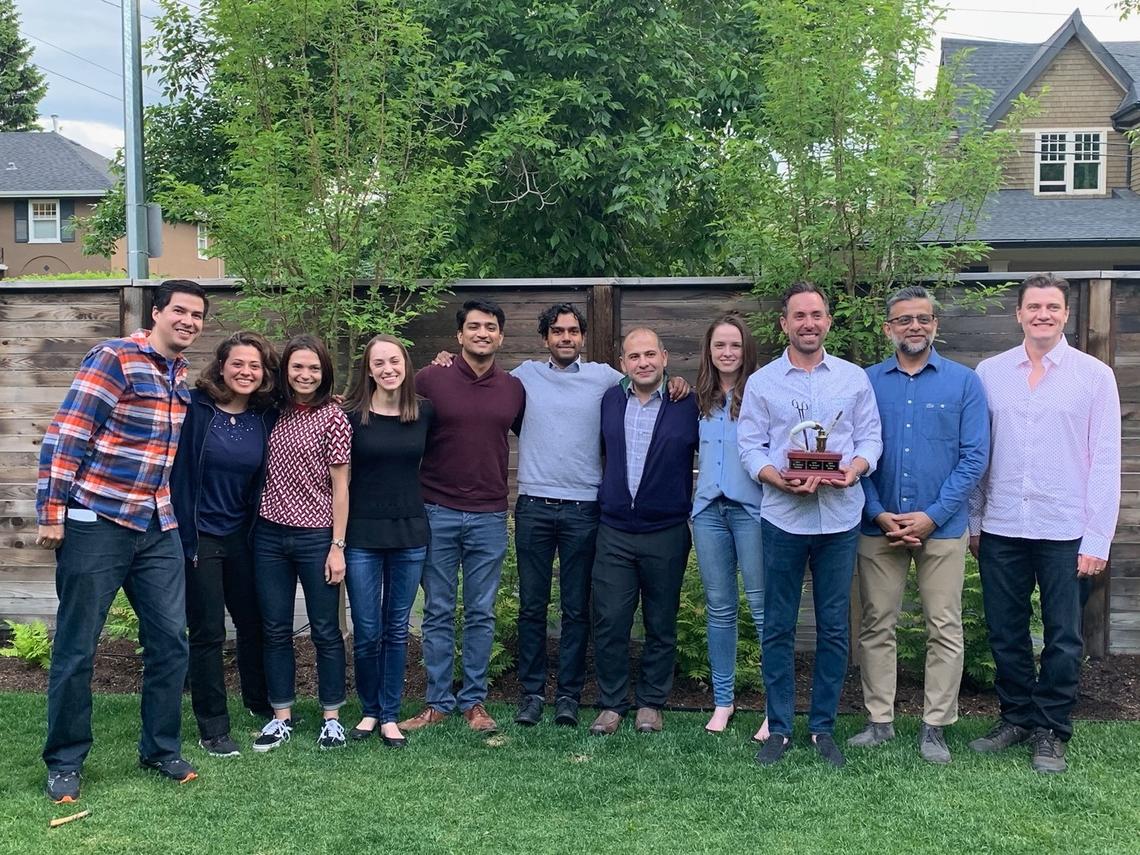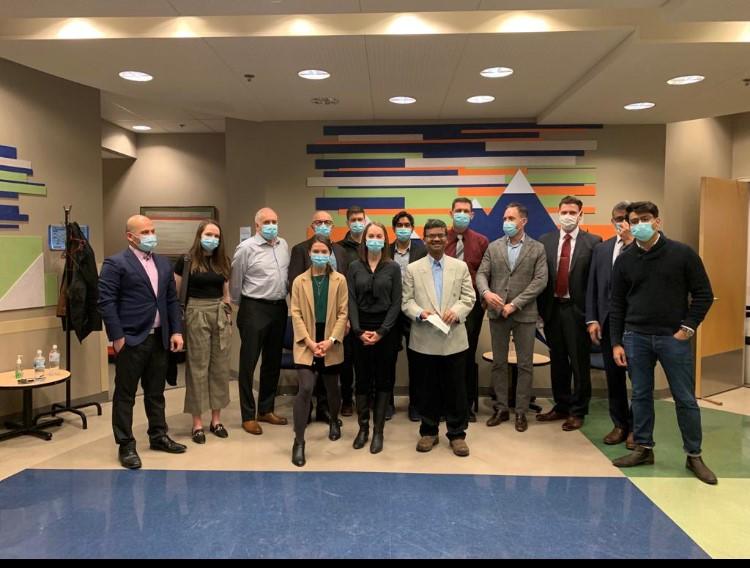Calgary Cardiac Surgery Residency Program
Program overview
The Calgary Cardiac Surgery Residency Program is structured for residents to receive ample clinical exposure, with opportunities to gain academic training. During the six-year residency, trainees devote five years to developing clinical competency through rotations in:
- Adult Cardiac Surgery
- Pediatric Cardiac Surgery
- Vascular Surgery
- Thoracic Surgery
- General ICU
- Cardiovascular ICU
- General Cardiology
- Interventional Cardiology
Trainees complete the Royal College Surgical Foundations Program in the first two years.
Our program is renowned for exposing trainees to operations in general cardiac surgery, along with subspecialized areas including minimally invasive surgery, valvular surgery, aortic surgery, and arrhythmia surgery. When on-service, residents are assigned to clinical teams of two to three surgeons who provide dedicated operative teaching and carefully monitor trainee progression.
Trainees also receive one year of academic training, which can be extended based on the choice of study. Residents work with their program director, academic advisor, and mentors to develop a plan to gain an academic skillset that will be relevant to their clinical and career goals.
This allows residents to identify their career path and develop key skills to supplement their clinical skills. Past residents have completed the following programs:
- Master’s of Medical Education
- Master of Business Administration
- Master’s of Translation Medicine in Bioengineering
- Doctoral Studies
- Focused one-year studies on a novel project




Application requirements and selection process
The University of Calgary cardiac surgery residency program participates in the CARMS selection process. We do not offer international fellowships..
Program Director:
Dr. Muhammad Ahsan
muhammad.ahsan@albertahealthservices.ca
Lead Resident:
Dr. Ameen Basha
ameen.basha@albertahealthservices.ca
Program Administrator:
Samantha Hardy
samantha.hardy@albertahealthservices.ca
Candidates should:
- Demonstrate potential in acquiring surgical technical skills.
- Have a superior academic record.
- Demonstrate special proficiency in subjects related to our specialty.
- Demonstrate interest in cardiac surgery with at least one rotation on a cardiac surgery service. Please provide a reference letter from a faculty member on that service.
- Provide three references. Where possible, obtain references from academic specialists in cardiothoracic surgery, attesting to your interest and proficiency in the specialty, as well as comments on exemplary interpersonal skills.
- Candidates with an interest and/or proven experience in research, either at the basic science or clinical research level, are also encouraged to apply.
Residency in cardiac surgery may be entered via two routes:
- A six-year program beginning after medical school. Candidates interested in this option must follow the Canadian Resident Matching Service (CaRMS) application process.
- A three-year program after completion of general surgery. Candidates who have completed the general surgery program should refer to “Pathway 2” in the Royal College Specialty Training Requirements in Cardiac Surgery for the application form for subspecialty training.
Both streams qualify successful candidates to challenge the Royal College of Physicians and Surgeons of Canada specialty examinations.
Please follow the PGME application process.
- Foreign applicants are invited to apply to the six-year training program, by post only, and with written documentation of sponsorship from their University or government.
- International medical graduates must have their medical degree source verified prior to application.
As part of the national Canadian Residency Match System process, reviewers first evaluate all applications to select those who will receive an interview. Our multimodal evaluation strategy provides a fair assessment for all program applicants.
After the initial selection, applicants participate in a multimodal interview, which will be done virtually due to COVID-19.
During the interview participants will participate in:
- A situational judgement test (SJT; Google Form), during which applicants will read a scenario and rank responses from most to least appropriate.
- A virtual multiple mini-interview (MMI; Zoom), during which applicants will rotate between breakout rooms in a Zoom meeting, answering provided questions in each room.
- A panel interview (Zoom), which involves an open discussion between interviewees and a committee of surgeons and residents, during which applicants can ask questions about the program.
Curriculum Overview
We follow the specialty training requirements set by the Royal College of Physicians and Surgeons of Canada. Our curriculum is organized based on the Competence by Design (CBD) framework. Residents complete Entrustable Professional Activities (EPAs) which serve as training objectives.
The first two years consist of core training, exposure to the basics of surgery, and involve various disciplines. This prepares residents for the Royal College Surgical Foundations Exam.
Rotations provide a strong foundation in surgical skills and the objectives of training set out by the Royal College of Physicians and Surgeons of Canada. The program offers basic grounding in anesthesia, vascular surgery, intensive care and subspecialty cardiology rotations such as echocardiography and advanced heart failure.
Cardiac surgery trainees complete this Academic Enrichment year in clinical research, basic science research, or further training focused clinical area. This year can be completed at the University of Calgary or elsewhere at the request of the candidate and at the discretion of the program director and section head.
Candidates can pursue a Masters or PhD or to develop a special interest and expertise in an area of interest.
The residents’ senior years strengthen the individual resident's skills and interests. The following rotations are required as per the objectives of training of the Royal College of Physicians and Surgeons. Pediatric Cardiac Surgery rotations take place at the Stollery Children’s Hospital in the University of Alberta. The chief resident year represents the capstone training year wherein residents complete the transition to practice section of the CBD curriculum.
The University of Calgary offers a Clinical Investigator Program (CIP). Residents are strongly supported in their academic pursuits. This Royal College-certified program provides residents the opportunity to pursue an MSc or PhD in a discipline related to their specialty or subspecialty training.
Academic half days consist of a seminar series and resident didactic lectures. Additional academic activities include evidence-based journal clubs, wet labs, and lectures from visiting speakers. In collaboration with the department of surgery, academic half days also include:
- Surgical Foundations Lectures (PGY 1)
- CanMEDs Sessions (PGY 1-6)
There are also weekly clinical multidisciplinary rounds providing opportunities for case discussions and clinical scenarios where best practices are reviewed.

